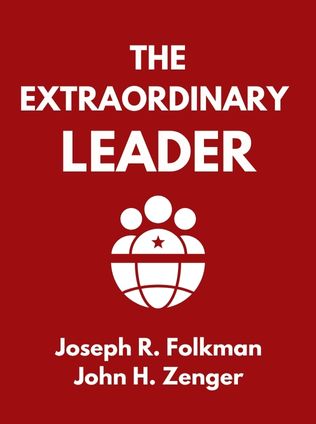
The Extraordinary Leader
Turning Good Managers into Great Leaders
By Joseph R. Folkman, John H. Zenger
Published 11/2019
About the Authors
John H. Zenger, D.B.A., is the CEO and co-founder of Zenger/Folkman, a firm that employs evidence-based, positive methods to strengthen organizations and those who lead them. He is the author or co-author of seven books on leadership and teams and is considered one of the most authoritative voices on improving organizational performance and developing leadership.
Joseph Folkman, Ph.D., is the president and co-founder of Zenger/Folkman. He is a renowned expert in the field of survey design and data analysis. He is the author of four other books: Turning Feedback Into Change, Making Feedback Work, Employee Surveys That Make a Difference, and The Power of Feedback.
Main Idea
The book The Extraordinary Leader: Turning Good Managers into Great Leaders by John H. Zenger and Joseph Folkman aims to demystify leadership by identifying key competencies necessary for effective leadership. It emphasizes the importance of focusing on strengths rather than weaknesses and provides research-based strategies for developing leadership skills both in individuals and organizations.
Table of Contents
- Introduction
- Demystifying Leadership
- Great Leaders Make a Great Difference
- The Organization's Objective
- Good Versus Bad Thinking
- Four Stages of Career Growth
- Simplifying Leadership
- The Competency Quest
- Leaders Must Fit Their Organization
- Great Leaders Possess Multiple Strengths
- Fatal Flaws Must Be Fixed
- New Insights Into Leadership Development
- A Case Study in Leadership Development
- What Individuals Do to Become Great Leaders
- The Organization's Role in Developing Leaders
- Greater Success
Demystifying Leadership
Leadership, often shrouded in ambiguity, is presented as a skill that can be consciously learned and developed. The authors analyze vast amounts of data to reveal that effective leadership competencies can be grouped into five clusters, akin to the poles of a tent:
- Character: The ethical standards, integrity, and authenticity of a leader.
- Personal Capability: Includes analytical and problem-solving skills, along with technical competence.
- Focus on Results: The ability to impact the organization and get things done.
- Interpersonal Skills: Leadership expressed through communication and the impact on others.
- Leading Organizational Change: The ability to produce change within the organization.
Each of these clusters plays a critical role in defining a great leader, and the highest expression of leadership involves leading significant change.
Great Leaders Make a Great Difference
Effective leaders are distinguished by high productivity, low turnover, high customer satisfaction, and innovation. The organization benefits from developing more great leaders as they contribute significantly to their units, set examples, and elevate performance standards. Instead of fixing low-performing leaders, focusing on helping good leaders become great yields the most significant benefits.
"Effective leadership is best defined and measured by the results produced." - John H. Zenger and Joseph Folkman
The Organization's Objective
An organization thrives by developing as many great leaders as possible. These leaders make profound contributions, set examples, and create a culture of excellence. Focusing on strengths rather than weaknesses is essential for achieving extraordinary leadership.
Good Versus Bad Thinking
The authors challenge the binary thinking of leaders being either good or bad. Instead, they propose a spectrum: bad, good, and great. This perspective encourages individuals to strive for extraordinary leadership rather than being content with being merely good.
"Good is good, but the ultimate target is extraordinary leadership. Don't be satisfied with good performance." - John H. Zenger and Joseph Folkman
Four Stages of Career Growth
The book outlines four stages of career growth:
Sign up for FREE and get access to 1,400+ books summaries.
You May Also Like
The Subtle Art of Not Giving a F*ck
A Counterintuitive Approach to Living a Good Life
By Mark MansonRich Dad Poor Dad
What the Rich Teach Their Kids About Money - That the Poor and Middle Class Do Not!
By Robert T. KiyosakiHow To Win Friends and Influence People
The All-Time Classic Manual Of People Skills
By Dale CarnegieQuiet: The Power of Introverts
The Power of Introverts in a World That Can't Stop Talking
By Susan Cain



















